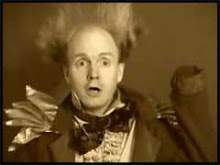"'What kind of man are you?' he asked. 'I am a clown,' I said, 'and I collect moments.'"
—from The Clown by Heinrich Böll
What's really happening?
When I played with the "fools notice what others overlook" game from the previous entries on "Inventing Theatre Games and Exercises" (read parts one and two before you read this post), I ran through the activity of entering, juggling plungers, and exiting. The next time, when I paused after juggling the plungers with plastic handles, I noticed my hands hurt. I had not noticed this stinging sensation the first time, although I'm sure it was there.
It's a little detail, not really important if my goal was to show off my meager juggling skills. But that's not my goal. I love these little moments, because they are true and human and unexpected. Most of the time we gloss over them. Instead of moving on to the next trick, I could stop and react to the pain. I could try to solve the problem and make my hands feel better. I could struggle with another trick because of the pain. To me, this is much more interesting than just juggling.
Like a fool, notice what really happens between the lines of your routine, script, improv, painting, process, or even life event. What can you do with that information instead of ignoring it?
Sunday, November 25, 2007
Monday, November 12, 2007
Invent Theatre Games and Exercises Part 2
So, I start with the question from the first part of inventing games and exercises to jump-start my drained battery: What problem would you like to work on, what goal do you have, or what concept would you like to play with?
In the spirit of this blog, let's say I want to practice thinking foolishly. To be more specific, I'll pick one of Roger Von Oech's tools (as listed in the previous entry, Think Like a Fool), fools notice things others overlook. Now I have to turn an abstract, intellectual concept into a physical exercise and I do this by asking questions:
Why do others overlook things? Why do I overlook things?
I can use all the senses, not just sight. The things I notice don't have to be anything profound, just stuff I didn't notice before. I try this exercise and come up with a step four, which is to act on what I notice. I enter and see that the three plungers look like bowling pins lined up, and I somersault towards them as if I am a bowling ball. From here, I begin to get ideas and develop material.
In the spirit of this blog, let's say I want to practice thinking foolishly. To be more specific, I'll pick one of Roger Von Oech's tools (as listed in the previous entry, Think Like a Fool), fools notice things others overlook. Now I have to turn an abstract, intellectual concept into a physical exercise and I do this by asking questions:
Why do others overlook things? Why do I overlook things?
- Their point of view is limited.
- They look at what they are comfortable looking at out of habit.
- They limit what they look at so as not to be overwhelmed.
- Looking out into the grand canyon.
- Looking over a four leaf clover.
- Wearing blinders.
- Open my eyes wider, be aware of things in the periphery.
- Change my physical relationship to the world.
- Take more time with each thing I encounter.
I can use all the senses, not just sight. The things I notice don't have to be anything profound, just stuff I didn't notice before. I try this exercise and come up with a step four, which is to act on what I notice. I enter and see that the three plungers look like bowling pins lined up, and I somersault towards them as if I am a bowling ball. From here, I begin to get ideas and develop material.
Saturday, November 3, 2007
Invent Theatre Games and Exercises Part 1
As a solo performer, I'm constantly facing the problem of how to keep working creatively on a daily basis when I'm not out touring. The answer seems to be to rehearse daily, but it can be intimidating to fill the void of both time and space in an empty rehearsal studio.
What I often do to get restarted is invent a theatre game or exercise. I'll share some of these in upcoming entries, but I encourage you to invent your own. These can have more power than ones you get from others, although it's helpful to familiarize yourself with games and exercises from books by Viola Spolin, Clive Barker (not the horror writer), Keith Johnstone, Davis Robinson, John Wright, and others.
To start inventing ask: What problem would you like to work on, what goal do you have, or what concept would you like to play with? Try to be specific and keep it small and achievable. Can you already think of a game or exercise that you could adapt for your problem, goal, or concept?
To be continued...
What I often do to get restarted is invent a theatre game or exercise. I'll share some of these in upcoming entries, but I encourage you to invent your own. These can have more power than ones you get from others, although it's helpful to familiarize yourself with games and exercises from books by Viola Spolin, Clive Barker (not the horror writer), Keith Johnstone, Davis Robinson, John Wright, and others.
To start inventing ask: What problem would you like to work on, what goal do you have, or what concept would you like to play with? Try to be specific and keep it small and achievable. Can you already think of a game or exercise that you could adapt for your problem, goal, or concept?
To be continued...
Subscribe to:
Posts (Atom)



